What You Need To Know Before You Start Library School
Guidance from those who have been there can help prospective students as they consider librarianship and choose a library science program.

Nicole Gustavsen entered library school planning to pursue public librarianship—dreams that were dashed when they visited their city’s public library. “I saw a man flip out on one of the circulation assistants, to the point where he had to be dragged out screaming by security,” Gustavsen says.
Though Gustavsen had worked in their college’s library, grad school didn’t prepare them for the day-to-day reality of public librarianship. “We got almost no practical experience. If we didn’t seek it out ourselves, either through jobs or work study or capstone projects, then we didn’t get it.”
While Gustavsen found their footing in academic libraries, several classmates later realized they’d made “an expensive mistake.” Guidance from those who have been there can help prospective students as they consider librarianship and choose a library science program.
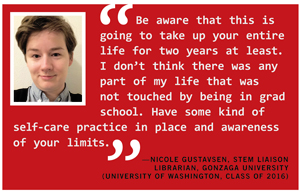 NO SUBSTITUTE FOR TIME ON SITE
NO SUBSTITUTE FOR TIME ON SITE
Many book lovers assume library school will be a natural fit. But readers’ advisory and collection development are just two of librarianship’s many facets. Joyce Bryant Angelucci, who earned her degree at Syracuse University, NY, in 2018 after a long career as a support staffer in academic libraries, urges applicants to think broadly.
“Some people’s perceptions of libraries are very dated. So they may go into library school thinking, ‘I’m just going to work with books all day.’ But there are special collections, archives, cataloging, interlibrary loans. I’ve worked in health sciences libraries. There are librarians who work directly with doctors and nurses in helping them find the information they need.”
Ellen Morgan, library specialist for adults and teens at the Myersville Community Library, part of the Frederick County Public Libraries System (FCPL), MD, attends Clarion University of Pennsylvania online. She advises applicants to get library experience first. If they can’t work in a library, they should volunteer or visit. “Go to the library as a user, but also pay attention to what the staff is actually doing. Go to story time, and see and think about the prep that had to go into it. Observe and talk to the people at the desk and see what they have to say.”
Those who decide on library school should continue to pursue work in libraries—though the coursework is valuable, it often diverges from hands-on librarianship. Kait Wolfe, who attends St. Catherine’s University, St. Paul, says that her classes reflect best practices, not reality. When she worked on a class project cataloging materials from an art museum’s backlog, “We were incredibly thorough. We spent all semester creating six MARC records. At my regular job, I create MARC records with far less information by the dozens every day.”
And there are some parts of the job for which classes can’t prepare students. Elizabeth Halberstadt, a teacher librarian at Stono Park Elementary School, Charleston, SC, worked in private school libraries before getting her degree from the University of Southern Mississippi, Hattiesburg. She notes, “In a school library, you are typically the only specialist in your building that’s a librarian.” Prospective students should be aware that many school librarians need to actively seek out opportunities to network, she says.
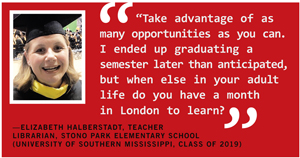 PICKING YOUR PROGRAM
PICKING YOUR PROGRAM
Because relocating is potentially difficult and expensive, many students opt for nearby schools. Gustavsen selected the University of Washington (UW), Seattle, because they lived in the Pacific Northwest and had gotten their BA from the institution a year earlier, though the school’s strong academic reputation was also a factor. While they are satisfied with the education, they wish they had explored other schools to see what was out there.
Angelucci did her due diligence. Like many students with a family, she couldn’t move, so she was limited to online programs. Though most librarians in the Philadelphia area attend Drexel University, Angelucci cast a wider net, looking at schools such as Clarion University and Rutgers University before selecting the University of Syracuse.
Those opting for distance learning should think about the experience they want: Do they prefer a synchronous program, where all students in a class must be present at once, or an asynchronous experience, where students complete work on their own schedule? Angelucci wanted some real-time interaction with her classmates and professors, and Syracuse’s mix of synchronous and asynchronous styles appealed to her.
So did the school’s welcoming environment, from an admissions coordinator calling to tell her she had been accepted, to an orientation where she met her future classmates. “Just having that already made me feel part of the community,” she says.
Students interested in distance learning who want some face-to-face contact should also consider hybrid programs. Sabrina Davis, who graduated from Emporia State University, KS, in 2018 and now works as the interim director at the Frederick M. Smith Library at Graceland University, Lamoni, IA, did most of her studies online, but once a month she attended in-person classes—an opportunity that allowed her to network with classmates and get to know her professors.
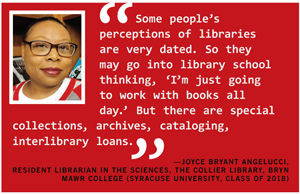 THE VALUE OF THE DEGREE
THE VALUE OF THE DEGREE
Given the hefty price tag of some graduate school programs (per American Libraries, median tuition for library science programs at out-of-state private colleges is $37,500 [bit.ly/AmericanLibraries])—and the often low salaries that librarians earn (according to LJ’s 2019 Placements & Salaries survey, average yearly income for full-time working 2018 graduates was $55,357)—it’s imperative that potential applicants go in with their eyes open. Before deciding on Clarion, Morgan rejected the prestigious but pricey University of Maryland (UMD). “It was going to take almost twice as long and cost twice as much,” she says.
At UMD, per credit rates are $1,182 for Maryland residents and $2,076 for nonresidents. By contrast, per credit rates at Clarion are $740.60 for Pennsylvania residents ($676.60 for online) and $1,075.10 for non-Pennsylvania residents ($770.10 for online).
Having worked in libraries for several years, Morgan has noticed that “no one really cares where your degree comes from as long as you have it. Whether you paid twice as much isn’t going to impress anyone.” For her, obtaining the degree is a “means to an end. I work with a lot of people who are part-time who are so good at it but have had a hard time going full-time because they don’t have the degree.”
She encourages students to look for ways to cut costs. Between semesters, she checked out a book from the library on the best scholarships of 2020 and noted anything for which she qualified. She’s also enrolled in a reimbursement program offered by FCPL, which covers up to $3,000 a year in tuition in return for a two-year work commitment.
Applicants should be wary of hidden costs. As an undergraduate at UW, Gustavsen lived in Washington, so their tuition was lower than for out-of-state students. However, graduate students in UW’s library science program pay the same rate regardless of where they live. As a result, sometimes Gustavsen had to drop a graduate class to be able to afford the tuition.
Angelucci advises students to do their research. Though she knew about organizations such as the American Library Association or the Association of College & Research Libraries (ACRL), she didn’t realize that they also offered “grants and scholarships for students, including students of color. That would have definitely helped me with some of the financial burden.”
She adds, “It would also have made me feel connected to other library students of color”—which would have been especially welcome, given that librarianship is an overwhelmingly white profession and that she was often one of the few students of color in her classes.
Academic librarianship is potentially an even more expensive investment. Sarah Honaker, who’s attending the online program at San José State University, CA, decided against becoming an academic librarian when she learned that many colleges and universities require librarians to have a second degree. At San Diego State University, where she received her BA, for instance, librarians must hold both an MLIS and a PhD.
Through ACRL’s website, Angelucci found out about residency programs, which let librarians cycle through different areas of the job over a period of two to three years. She’s now working at the Collier Library at Bryn Mawr College, PA, as a resident librarian in the sciences—something that “will make me a better candidate for my next job.”
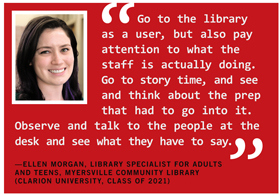 BEWARE BURNOUT
BEWARE BURNOUT
While students should embrace all that grad school has to offer, it’s also important to be wary of overdoing it—in a study by librarians Jade Geary and Brittany Hickey, 74.48 percent of librarians taking LIS classes reported experiencing burnout (bit.ly/StudyBurnout).
Morgan knew intellectually that the workload would be tough, but she didn’t realize just how difficult it was until she was in the thick of it. “I commute 45 minutes to work, so I would get home from work around seven. I’d start my homework at eight; I’d be finished by 11 every night. That’s all I did for weeks.”
Gustavsen had dealt with depression, anxiety, and an eating disorder, and their mental health worsened while they were in grad school, in part because of UW’s competitive atmosphere. “I always felt that I needed to live up to the school I had been accepted to.”
As Gustavsen piled on the commitments, working at UW’s Suzzallo & Allen Graduate Library and serving as a teaching assistant at an information literacy course at Seattle Central College, their stress ramped up. Classmates who remarked that library school isn’t that challenging made Gustavsen feel that they were the only one struggling, and they eventually dropped out of school to focus on their mental health before returning to complete the degree.
They caution students to know their boundaries. “Be aware that this is going to take up your entire life for two years at least. I don’t think there was any part of my life that was not touched by being in grad school. Have some kind of self-care practice in place and awareness of your limits.”
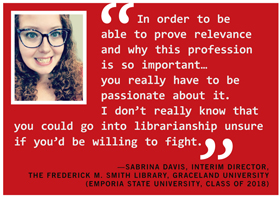 OPEN MINDS AND HEARTS
OPEN MINDS AND HEARTS
While applicants should have a clear reason for attending library school, they should also be flexible. Though Halberstadt’s goal was school librarianship, she participated in a wide range of activities and classes. As part of the school’s British Studies program, she spent a month in London learning about English libraries and archives and later presented her work in Crete in 2018 at the International Conference on Qualitative and Quantitative Methods.
“Take advantage of as many opportunities as you can.
I ended up graduating a semester later than anticipated, but when else in your adult life do you have a month in London to learn?” says Halberstadt. She also feels well equipped if she eventually decides to pursue public or academic librarianship.
Wolfe was determined to become a public librarian but had second thoughts once she learned that customer service was a big part of the job. On a whim, she applied for an opening for a metadata entry specialist position at East View Geospatial, a provider of maps and geospatial data. She got the job and is thriving there, but she marvels at how easily she might have overlooked this career path. “I had no idea—absolutely none—that so much of library work is done behind the scenes,” she says.
She adds, “Know that the field is in flux, that things are always changing. Be prepared to adapt to challenges.”
Above all, students and graduates stress, a love for the profession is key. While Gustavsen’s experience in graduate school was challenging, they don’t regret obtaining the degree; they now work at Gonzaga University, Spokane, WA, as the STEM liaison librarian, a job that’s immensely rewarding, and says. “I cannot imagine doing anything else.”
Whether librarians are standing up to book challenges, ensuring access to information, or showing stakeholders why libraries matter, they must be committed, says Davis. “In order to be able to prove relevance and why this profession is so important…you really have to be passionate about it. I don’t really know that you could go into librarianship unsure if you’d be willing to fight.”
RELATED
ALREADY A SUBSCRIBER? LOG IN
We are currently offering this content for free. Sign up now to activate your personal profile, where you can save articles for future viewing









Add Comment :-
Comment Policy:
Comment should not be empty !!!